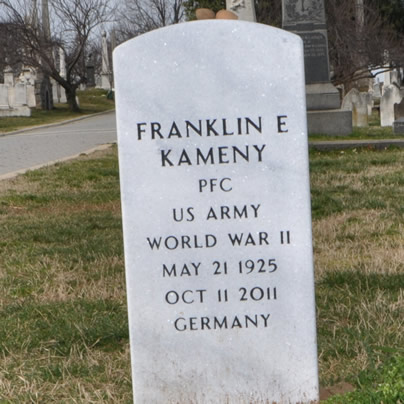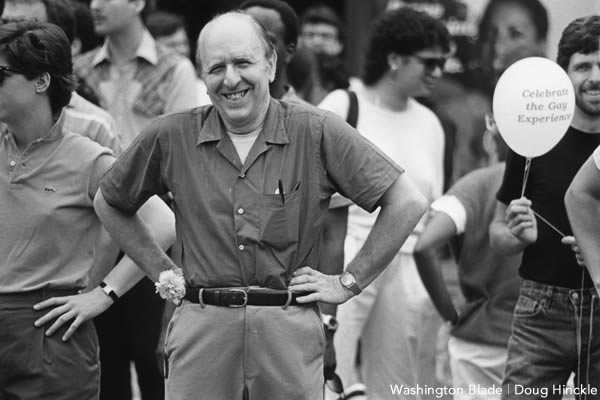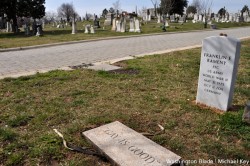Local
1 year later, Kameny’s ashes still not buried
Dispute over burial site remains unresolved


Pioneering gay rights activist, Frank Kameny died on Oct. 11, 2011, which happens to be National Coming Out Day. (Washington Blade photo by Doug Hinckle)
One year after gay rights pioneer Frank Kameny’s death in his Washington home at the age of 86, LGBT advocates said they would remember his legacy as they celebrate National Coming Out Day this week.
Kameny died of natural causes on Oct. 11, 2011, the day LGBT advocates have designated as National Coming Out Day.
His friends and admirers, while saddened by his loss, said it was befitting that Kameny departed on a day commemorating an action he may have been among the first to take part in in the late 1950s — a proud and open declaration that one is gay, lesbian, bisexual or transgender.
“His accomplishments for our community are immeasurable,” said veteran D.C. gay activist Paul Kuntzler
Kuntzler spoke to the Blade about Kameny during a candidate endorsement forum Tuesday night sponsored by the Gertrude Stein Democratic Club, an LGBT organization that Kuntzler and Kameny helped found in January 1976.
But Kuntzler and others who worked with Kameny said they remain troubled that an ongoing dispute between Timothy Clark, the heir and personal representative to Kameny’s estate, and the D.C. gay charitable group Helping Our Brothers and Sisters (HOBS) has resulted in the indefinite postponement of the burial of Kameny’s ashes.

A headstone once marked the the spot where advocates intended gay activist Frank Kameny to be buried, but legal action has halted the interment and the headstone has been removed. (Washington Blade file photo by Michael Key)
In August, an official with D.C.’s historic Congressional Cemetery, where Kameny’s ashes were to be buried, said an urn bearing the ashes remained in a storage vault at the cemetery’s headquarters near Capitol Hill while the estate dispute dragged on.
When asked if the ashes were still in storage at the cemetery, Congressional Cemetery President Paul Williams told the Blade on Wednesday, “There has been no substantial change in the case. That’s all I’m going to say.”
Both sides acknowledge that the dispute is over a disagreement about how to transfer the ownership of the cemetery plot from HOBS, which bought it earlier this year, to the Kameny estate, which is under the control of Clark.
HOBS executive director Marvin Carter has said HOBS is willing to sell the plot to the estate at the price the group paid for it earlier this year. The estate, through one of its attorneys, Glen Ackerman, has said HOBS bought the plot through donations from members of the LGBT community who knew and admired Kameny and that HOBS should transfer the title to the plot to the estate.
Earlier this year, Ackerman said Clark was troubled that some of Kameny’s longtime friends worked with HOBS to buy the plot and make arrangements for the burial without consulting Clark, who has legal authority over the ashes. Ackerman said then that Clark was concerned that HOBS might seek to bury others in the plot along with Kameny’s ashes since the plot can accommodate at least two coffins and three urns.
HOBS has said it has no intention of burying anyone else in the plot.
“The estate of Franklin Kameny is currently in negotiations in an effort to settle outstanding matters related to the estate,” Ackerman said in a statement released on Tuesday. “We cannot comment on these negotiations or the status of the various matters as doing so may compromise the progress that has been made thus far,” he said. “All involved are hopeful that resolution may be reached in the near future.”
“HOBS is working diligently and in good faith to resolve all issues concerning the plot at Congressional Cemetery and the final burial of Frank’s ashes at the Cemetery in a manner and under circumstances that will protect and advance Frank’s reputation in and contributions to the LGBT community,” Carter said in a statement issued to the Blade.
Records in the D.C. Superior Court’s civil division, where the Kameny estate case remains pending, show that at least one creditor filed suit against the estate on Aug. 7 to challenge a decision by the estate to reject the creditor’s request for repayment of a $12,000 loan and $3,075 of accrued interest on the loan for a total of $15,075.
The suit says the loan was made by D.C. gay activist and longtime Kameny friend Craig Howell in two increments in 2003 and 2004, according to Mindy Daniels, Howell’s attorney.
Court papers filed by the estate challenge the legal authority of Howell’s claim for the loan repayment on several grounds, saying, among other things, that Howell waived a requirement that Kameny make interest payments on the loan prior to Kameny’s death.
The Human Rights Campaign, a national LGBT political group that organizes Coming Out Day activities, included a remembrance of Kameny on its website this week.
“One year ago, the LGBT community lost equality pioneer Frank Kameny, a man whose tireless activism blazed a trail for the entire LGBT community,” the HRC web posting says. “This National Coming Out Day, we remember Frank Kameny by honoring his legacy as a forerunner of the modern LGBT rights movement.”
Kameny, a D.C. resident since the 1950s, is credited with playing a key role in laying the foundation for the modern gay rights movement beginning in the early 1960s, nearly a decade before the 1969 Stonewall riots in New York’s Greenwich Village.
He began his fight for LGBT equality in 1957 after being fired for being gay from his job as an astronomer at the U.S. Army Map Service. After losing administrative and lower court appeals, Kameny took his case to the U.S. Supreme Court, where he wrote his own petition urging the high court to hear the case in 1961.
The Supreme Court denied his petition and left standing a lower court ruling upholding his firing. But LGBT advocates and historians have said Kameny’s petition, or brief, filed with the high court represented the first known time anyone submitted an unapologetic and legally reasoned argument before a court of law in support of equal rights for gay people in the United States.
A short time later, Kameny co-founded the Mattachine Society of Washington, the city’s first gay rights organization. Although Mattachine Society groups had formed in other cities beginning in the 1950s, the D.C. group under Kameny’s leadership took on a far more assertive posture in pushing for gay equality, laying the groundwork for the post-Stonewall Riots LGBT rights movement in the years ahead, according to author David Carter, who is currently writing a Kameny biography.
Maryland
Md. Commission on LGBTQIA+ Affairs released updated student recommendations
LGBTQ students report higher rates of bullying, suicide

The Maryland Commission on LGBTQIA+ Affairs has released updated recommendations on how the state’s schools can support LGBTQ students.
The updated 16-page document outlines eight “actionable recommendations” for Maryland schools, supplemented with data and links to additional resources. The recommendations are:
- Developing and passing a uniform statewide and comprehensive policy aimed at protecting “transgender, nonbinary, and gender expansive students” against discrimination. The recommendation lists minimum requirements for the policy to address: name, pronoun usage, and restroom access.
- Requiring all educators to receive training about the specific needs of LGBTQ students, by trained facilitators. The training’s “core competencies” include instruction on terminology, data, and support for students.
- Implementing LGBTQ-inclusive curricula and preventing book bans. The report highlights a “comprehensive sexual education curriculum” as specifically important in the overall education curriculum. It also states the curriculum will “provide all students with life-saving information about how to protect themselves and others in sexual and romantic situations.”
- Establishing Gender Sexuality Alliances “at all schools and in all grade levels.” This recommendation includes measures on how to adequately establish effective GSAs, such as campaign advertising, and official state resources that outline how to establish and maintain a GSA.
- Providing resources to students’ family members and supporters. This recommendation proposes partnering with local education agencies to provide “culturally responsive, LGBTQIA+ affirming family engagement initiatives.”
- Collecting statewide data on LGBTQ youth. The data on Maryland’s LGBTQ youth population is sparse and non-exhaustive, and this recommendation seeks to collect information to inform policy and programming across the state for LGBTQ youth.
- Hiring a full-time team at the Maryland Department of Education that focuses on LGBTQ student achievement. These employees would have specific duties that include “advising on local and state, and federal policy” as well as developing the LGBTQ curriculum, and organizing the data and family resources.
- Promoting and ensuring awareness of the 2024 guidelines to support LGBTQ students.
The commission has 21 members, with elections every year, and open volunteer positions. It was created in 2021 and amended in 2023 to add more members.
The Governor’s Office of Communication says the commission’s goal is “to serve LGBTQIA+ Marylanders by galvanizing community voices, researching and addressing challenges, and advocating for policies to advance equity and inclusion.”
The commission is tasked with coming up with yearly recommendations. This year’s aim “to ensure that every child can learn in a safe, inclusive, and supportive environment.”
The Human Rights Campaign’s most recent report on LGBTQ youth revealed that 46.1 percent of LGBTQ youth felt unsafe in some school settings. Those numbers are higher for transgender students, with 54.9 percent of them saying they feel unsafe in school.
Maryland’s High School Youth Risk Behavior Survey reveals a disparity in mental health issues and concerns among students who identify as LGBTQ, compared to those who are heterosexual. LGBTQ students report higher rates of bullying, feelings of hopelessness, and suicidal thoughts. Nearly 36 percent of LGBTQ students report they have a suicide plan, and 26.7 percent of respondents say they have attempted to die by suicide.
The commission’s recommendations seek to combat the mental health crisis among the state’s LGBTQ students. They are also a call for local and state governments to work towards implementing them.
Virginia
Va. lawmakers consider partial restoration of Ryan White funds
State Department of Health in 2025 cut $20 million from Part B program

The Virginia General Assembly is considering the partial restoration of HIV funding that the state’s Department of Health cut last year.
The Department of Health in 2025 cut $20 million — or 67 percent of total funding — from the Ryan White Part B program.
The funding cuts started with the Trump-Vance administration passing budget cuts to federal HIV screening and protection programs. Rebate issues between the Virginia Department of Health and the company that provides HIV medications began.
Advocates say the funding cuts have disproportionately impacted lower-income people.
The Ryan White HIV/AIDS Program, a federal program started in 1990, provides medical services, public education, and essential services. Part B offers 21 services, seven of which remained funded after the budget cuts.
Equality Virginia notes “in 2025, a 67 percent reduction severely destabilized HIV services across the commonwealth.”
Virginia lawmakers have approved two bills — House Bill 30 and Senate Bill 30 — that would partially restore the funding. The Ryan White cuts remain a concern among community members.
Both chambers of the General Assembly must review their proposed changes before lawmakers can adopt the bills.
“While these amendments aren’t a full restoration of what community-based organizations lost, this marks a critical step toward stabilizing care for thousands of Virginians living with HIV,” said Equality Virginia Executive Director Narissa Rahaman. “Equality Virginia plans to continue their contact with lawmakers and delegates through the conference and up until the passing of the budget.”
“We appreciate lawmakers from both sides of the aisle who recognized the urgency of this moment and will work to ensure funding remains in the final version signed by the governor,” added Rahaman.
District of Columbia
D.C. Black Pride theme, performers announced at ‘Speakeasy’
Durand Bernarr to headline 2026 programming

The Center for Black Equity held its 2026 DC Black Pride Theme Reveal event at Union Stage on Monday. The evening, a “Speakeasy Happy Hour,” was hosted by Anthony Oakes and featured performances by Lolita Leopard and Keith Angelo. The Center for Black Equity organizes DC Black Pride.
Kenya Hutton, Center for Black Equity president and CEO, spoke following the performances by Leopard and Angelo. Hutton announced this year’s theme for DC Black Pride: “New Black Renaissance.”
Performers for 2026 DC Black Pride were announced to be Bang Garcon, Be Steadwell, Jay Columbus, Bennu Byrd, Rue Pratt and Akeem Woods.
Singer-songwriter Durand Bernarr was announced as the headliner for the 2026 festivities. Bernerr gave brief remarks through a video played on the screen at the stage.
DC Black Pride is scheduled for May 22-25. For more information on DC Black Pride, visit dcblackpride.org.


















